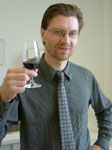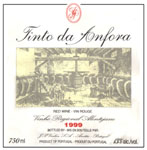![]()
Recent Articles

Get
all the evaluations for
the November
Release
Subscribe
to Vintage Assessments today
by Clicking
Here
This
not-for-profit website is dedicated to the discerning reader!
Canada's
newest Master of Wine
Torontonian
Igor Ryjenkov
National Post Weekly Wine & Spirits Columnist
Saturday, October 25, 2003
winefind.ca
If you want to buy a wine, just click on the wine name
below and you will instantaneously connected with the LCBO database. The wine
name will appear in blue and all you have to do is click on the name again and then the next screen will provide
details along with the store search. Just click on the
search. The number of bottles in each store is updated nightly.
You should call the store first to see if stock still remains (each store
phone number is provided).
It is the height of wine expertise. Love them or fear them, the Masters
of Wine (or MWs as they are called) are a force to be reckoned with. There
are only some 260 in the world and, when it comes to wine, they set the
standards that separate the wheat from the chaff.
 They
come in all shapes and sizes, and more importantly gender. It was
originally thought of as being a men’s only club. Just this month there
was one more, Torontonian Igor Ryjenkov is the first resident Canadian to
join this exclusive club. At 35 years of age, he is also the first Russian
to be elevated to this status.
They
come in all shapes and sizes, and more importantly gender. It was
originally thought of as being a men’s only club. Just this month there
was one more, Torontonian Igor Ryjenkov is the first resident Canadian to
join this exclusive club. At 35 years of age, he is also the first Russian
to be elevated to this status.
Those thinking that becoming an MW is a snap are quite mistaken. Only 260
Masters of Wine in 17 countries have passed the exams since its inception
in 1953. The Institute of Masters of Wine is London-based and aims to
produce outstanding wine professionals, not only with a great breath of
wine knowledge, but also an extensive understanding of the wine trade.
Many years ago when I first toyed with the idea of taking the program, I
discovered that it was only geared for the UK wine trade. Today, the MW
thrust has become much more international and useful.
Russian-born Ryjenkov received his Bachelor in Languages from Moscow
Institute of International Relations in 1990 and immigrated to Canada in
1992. “I grew up with a beer and
vodka background,” admits Ryjenkov, “and
didn’t know anything about wine. I was initially skeptical when a friend
told me that different wines had unique tastes. This universe of wine
flavours soon became evident while attending a tutored tasting at
Niagara’s Hillebrand winery in 1994. It
wasn’t long before I joined the now-defunct Sommelier Guild of Canada
and began tasting in earnest.
The hobby turned serious in 1996 after he enrolled in
local Wine & Spirit Education Trust courses. He was top of his class
for the higher Certificate and won a scholarship and passed the Diploma
with honours. In 1999, he became a Vintages Product Consultant for the
LCBO.
“The
hard cost of becoming an MW is about $5,000 plus a lot of time,” say
Ryjenkov. The first step is to get your wine diploma. Then you have to sit
two sets of MW annual exams at $1,600 US apiece. For North Americans,
these are held in Napa, California. There are three parts: written exams,
tasting identification and a dissertation. Only 12 wines are tasted daily
for three days. We might be asked to identify the grape varietal, origin,
assess the quality, winemaking techniques and, in some instances, the
vintage.
It is surprising to discover that there is no testing of
MW palates for component threshold sensitivity or consistency. So while
MWs are extremely knowledgeable, only the latter will truly demonstrate
whether an individual is actually competent for international wine
judgings.
Ryjenkov has recently returned to visit his brother who
lives near Moscow and father who lives in southwest Russia. “The key
question is whether the LCBO will be able to keep this new MW on their
payroll. “I would like to get more involved with wine acquisition,”
says
Ryjenkov and is waiting to see what the LCBO is
prepared to offer.
All three other Canadian MWs have flown the coup: David
Lake, the winemaker for Columbia Winery, lives in Washington State; David
Gleave, a wine merchant, lives in London; and Michael Palij imports
Italian wines in Oxford.
Ryjenko has his own personal likes when it comes to wine. Chateaux Leoville Barton is
one of his favourite Bordeaux. “It’s not that I don’t like Burgundy,
I do – but Bordeaux seems to be more reliable in terms of quality
transformation when aged. Right now, there is a great French renaissance
in winemaking and you can expect to see better and less expensive wines
emerging from the enormous Pays d’Oc region, which is many times larger
than all of Australia.” He predicts that the next big wave might very
well be Syrah from Argentina. As for obscure wines, Portugal is extremely
interesting, albeit an uphill battle in terms of convincing consumers to
venture forth and try these tasty unfamiliar varietals.
 Make
a beeline for Ryjenkov’s best buy J.P.
Vinhos 1999 Tinto da Anfora (227256) a steal at
$12.95 on the LCBO general list. This relatively unknown Prortuguese red
is made from five indigeneous grapes grown in the Alentejo region. It was
aged in for one year in small Portuguese oak and chestnut barrels. The
result is a well balanced, tangy red that has refined cassis and ripe
cherry fruit flavours, which linger beautifully on the palate.
Make
a beeline for Ryjenkov’s best buy J.P.
Vinhos 1999 Tinto da Anfora (227256) a steal at
$12.95 on the LCBO general list. This relatively unknown Prortuguese red
is made from five indigeneous grapes grown in the Alentejo region. It was
aged in for one year in small Portuguese oak and chestnut barrels. The
result is a well balanced, tangy red that has refined cassis and ripe
cherry fruit flavours, which linger beautifully on the palate.
Check
out our winefind.ca tasting notes database
Our tasting note database goes back to January 1, 2001 and covers every Vintages release product for the past 31 months. There are approximately 5,000 notes in the database data. Just enter the name of the product, supplier name or CSPC number. Or you can search by type of wine, country of origin, even wine agent! Nothing could be easier. When you get your search results (starting with the most recent release), click on the item name and you will instantaneously connected to the FBTI Vintage Assessments database. You will see our tasting note along with the name of the agent. You can get information on the agent by clicking on the agent’s name. Also, you can check LCBO store inventory by clicking on Check LCBO Availability. It will automatically take you to the item you want to search.
To use our winefind.ca Tasting Notes Database: click here
Subscribe to Vintage Assessments Today • Click Here
|
Vintages November 2003 Release
|
Copyright Food & Beverage Testing Institute of Canada
2004
Prior written permission is required for any form of reproduction
(electronic or other wise) and or quotation.
Contact Michael Vaughan at
mbv@total.net